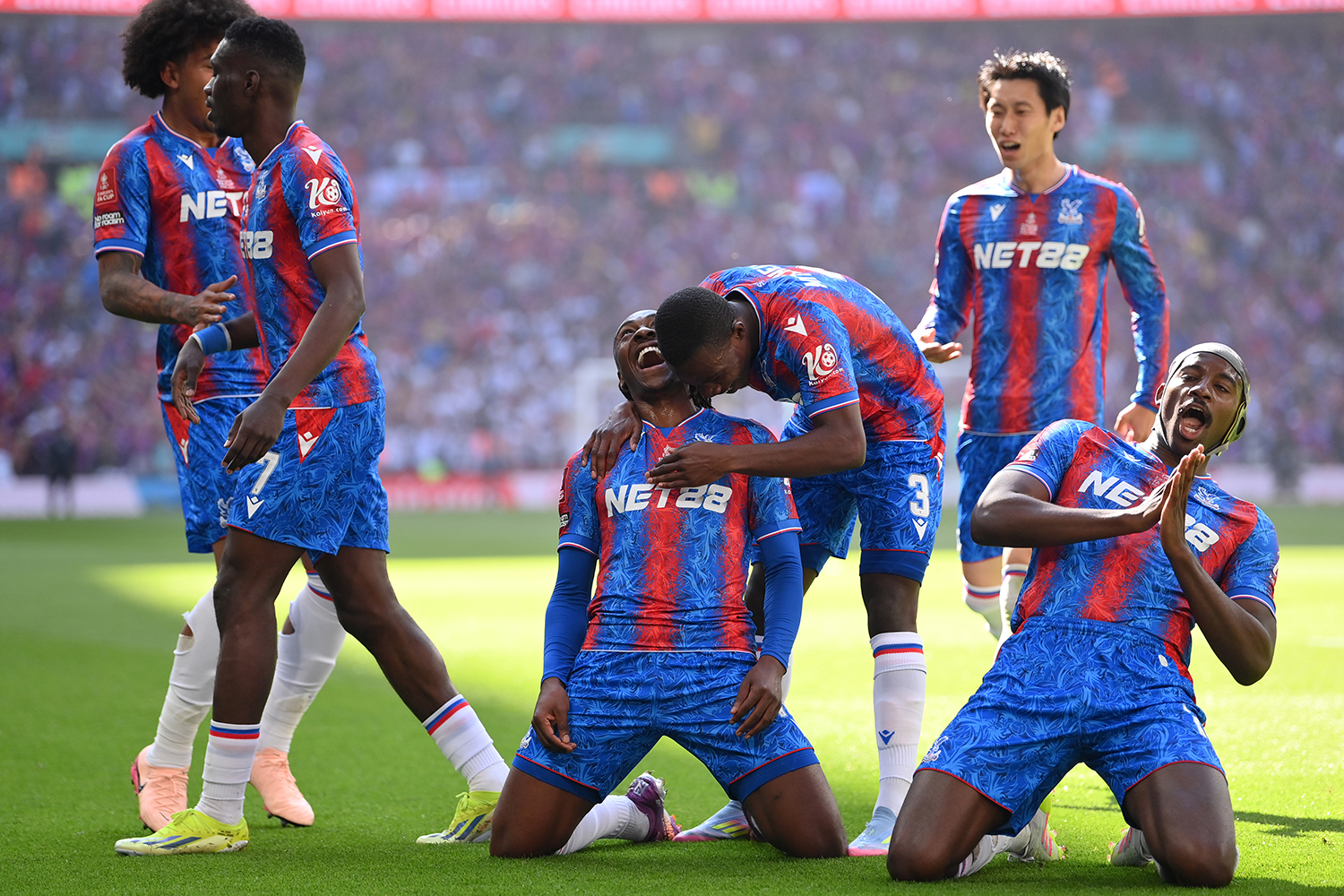In the churning abandon of the half of Wembley packed tight with Crystal Palace’s fans, those final few minutes must have been an agony. They yawned and stretched, on and on, an exquisite cortisol-drenched torture: 90 minutes, 95 minutes, 100 minutes, a lifetime, a generation, 119 years.
Crystal Palace has existed for more than a century, and never won a major trophy. It was not something the club tended to boast about, for obvious reasons, but it was part of its identity nonetheless: inescapable, undeniable, a burden held in common, a yearning passed from parent to child. It was scoured into the club’s soul. It had always been. It must have seemed, at times, like it would always be.
And then, all of a sudden, it was no more. The clock stopped. The wait ended. And those who had made it through emerged on the other side, blinking and breathless to find a world that was different in one tiny, but crucial, regard. Those final few minutes had been the final throes of what Palace were. That excruciating chrysalis had produced a new understanding: one in which Crystal Palace had won a major trophy.
Oliver Glasner’s team did so resolutely, intelligently, deservedly, brilliantly, a masterpiece of a performance that nullified Manchester City. They rode their luck, at times, most notably when the referee Stuart Attwell and his video assistant Michael Salisbury decided that Dean Henderson, the Palace goalkeeper, had handled the ball outside his penalty area but not denied Erling Haaland a goalscoring opportunity.
To his credit, Guardiola resisted the temptation to howl at his misfortune – thanks to the overwhelming power of narrative, Henderson duly stepped up and saved a penalty from Omar Marmoush – a recognition, perhaps, that his own team were far more culpable for their defeat than the officials.
Where Palace were disciplined, organised, smart, City had the air of a team trapped between two eras. Guardiola played Kevin De Bruyne and Bernardo Silva in central midfield, the pair of them reduced to tribute acts to their former selves; he searched for salvation in the form of Claudio Echeverri, a 19-year-old Argentine playmaker who had never previously played for the club. This tournament has, in recent years, been an afterthought for City, most often a useful exercise in stat-padding. It had taken on rather more significance this time around; it had come to symbolise an ill-deserved chance to rescue a wretched season.
To all but the partisan, that would have been a deflating conclusion to a season in which the Cup has rediscovered a little of its old magic, in which a competition that has spent years scrapping and clawing for relevance has finally found its niche. Finding itself cast, once more, as a consolation prize would have undone some of that good work.
Instead, though, the FA Cup now rests in the hands of a winner that feels a little more fitting, a team that will cherish the tournament not for what it is worth but simply for what it is, who see it, in many ways, as it used to be seen. “Wembley will shake,” as the tifo unfurled by Palace’s boisterous, white-clad ultras read before the game. “And it will be beautiful.”
That sense that the competition has the winner it deserves is accentuated by the nature of the team Glasner has built. Eberechi Eze, the totemic playmaker who scored the decisive goal, is an avatar for Palace’s modus operandi: a player plucked from the relative anonymity of the Championship, given a delayed chance to flourish against the game’s cosseted elite.
He is not the only one who has followed that path. So, too, has Adam Wharton, enticed to South London from Blackburn, and now a wonderfully composed, combative central midfielder. Marc Guehi, the captain, was factory-farmed by Chelsea, but it is at Selhurst Park that he has been afforded the chance to flourish.
Newsletters
Choose the newsletters you want to receive
View more
For information about how The Observer protects your data, read our Privacy Policy
The idea that Palace have turned themselves into a sort of Championship Select XI is, in truth, a little overdone. Their scouting is no less sophisticated in Europe. Glasner will have been aware of Maxence Lacroix and Daichi Kamada from his time in the Bundesliga, but to understand how they might thrive in England still requires both skill and courage. His transformation of Jean-Philippe Mateta, a journeyman turned into first a cult hero and then a budding superstar, requires its own TED Talk.
In the circumstances, though, it was understandable that the eye might be drawn to those players sourced closer to home. The FA Cup’s idiosyncratic magic is that it is English football’s great meeting place. It is the mortar that bonds the country’s prized, but frequently precarious, pyramid together, where English football sees an idealised version of itself.
It is rare that modern finals, so often contested by only vaguely interested superclubs, fit into that mould. This one does so perfectly. The FA Cup is supposed to be transformative. As those final few minutes ticked away, the world changed, just a little. One reality faded, and another came into being. Crystal Palace, after this, will never be the same again.
Photograph by Justin Setterfield/Getty Images

